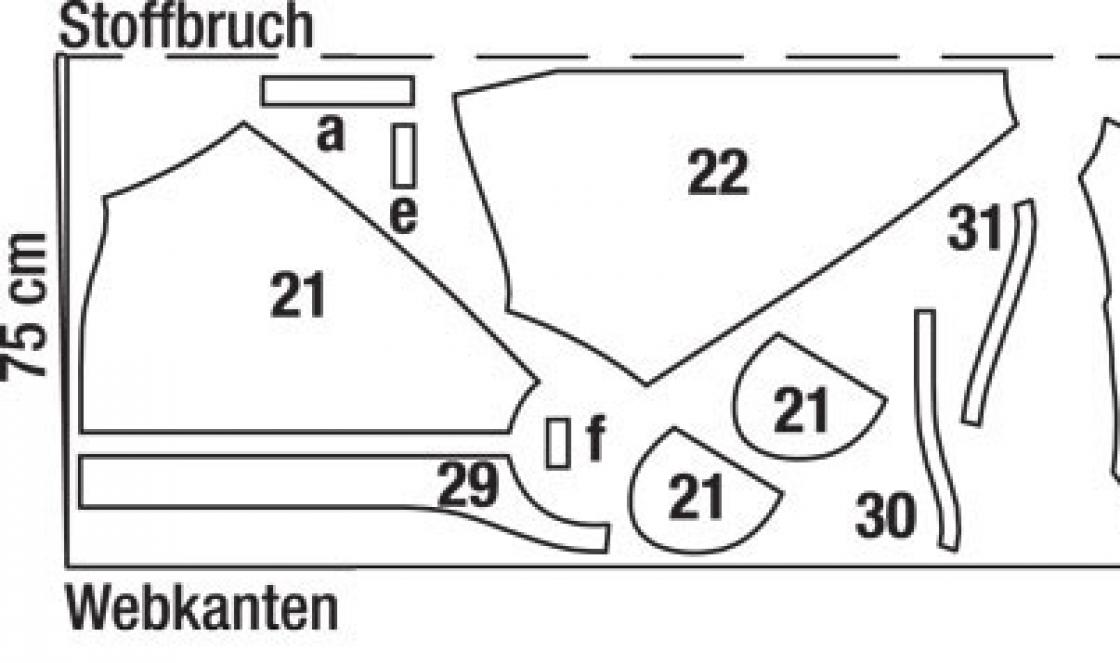Instructions: It is known that many violations in the behavior and development of a child are associated with insufficient attention from parents to him. However, according to psychologists, excessive care can be just as dangerous as its lack. This test will help you figure out how correct your educational position is. Here are 15 statements. At first glance, it may seem that not all of them are related to education. However, against each phrase, mark the number of points that correspond to your judgment on this issue.
“Strongly disagree” - 1 point.
“I would not rush to agree with this” - 2 points.
“This is probably true” - 3 points.
“Exactly right, that’s exactly what I think” - 4 points.
1. Parents must anticipate all the child’s problems in order to help him overcome them.
2. For a good mother, communication only with her own family is enough.
3. small child You should always hold it firmly while washing to prevent it from falling and getting hurt.
4. When a child does what he is supposed to do, he is on the right path and will be happy because of it.
5. It’s good if a child plays sports. But combat sports he should not practice, as this is fraught with physical injuries and mental disorders.
6. Parenting is hard work.
7. A child should not have secrets from his parents.
8. If the mother fails to cope with her responsibilities towards the children, this most likely means that the father is poorly fulfilling his responsibilities to support the family.
9. Mother's love cannot be excessive: you cannot spoil a child with love.
10. Parents should protect their child from the negative aspects of life.
11. You should not accustom your child to routine housework so that he does not lose the desire for any work.
12. If the mother did not manage the house, husband, and children, everything would happen less organized.
13. In the family’s diet, everything that is delicious and healthy should first of all go to the child.
14. Best protection against infectious diseases- limiting contacts with others.
15. Parents should actively influence which of their peers the child chooses as friends.
Processing the results
If you scored over 40 points, then your family can most likely be called child-centric. That is, the interests of the child are the main motive for your behavior. This position is worthy of approval. However, for you it is somewhat pointed. Psychologists call this overprotection. In such families, adults do everything for the child, strive to protect him from imaginary dangers, force him to follow his demands, judgments, and moods. As a result, the child develops passive dependence on his parents, which, as he grows older, increasingly impedes personal growth. You should trust your child more, believe in him, listen to his own interests, because it is rightly noted: “Raising children means teaching them to do without us.”From 25 to 40 points. Your child is not in danger of becoming promiscuous and spoiled because you give him enough, but not excessive, attention. Try to maintain this level of relationship.
If you scored less than 25 points, then you clearly underestimate yourself as a teacher, rely too much on chance and favorable circumstances. Problems in business and marital relationships often distract your attention from your child. And he has the right to expect great participation and care from you!
Test “Measure of caring for a child”
To determine the degree of parental care for their own child, you can ask parents to perform the following test.
Instructions
You need to analyze 15 statements. Some of the statements leave the impression that they do not relate to education. However, you must express your opinion on each judgment and give your score.
School of assessments
2 - it’s hard for me to agree with this;
3 - maybe this is true;
4 is absolutely correct. I agree with this.
Test assertions
1. Parents should anticipate all the problems that their child may encounter in order to help him overcome them.
2. In order to be a good mother, communication only with your own family is enough.
3. A small child should always be kept with you to prevent falls and bruises.
4. If a child does what he is supposed to do, he is on the right path in life.
5. The child should not engage in those activities sports which may result in physical injury.
6. Raising a child is hard and often thankless work.
7. A child should not have secrets from his parents.
8. If the mother does not have time to devote time to raising children due to her own professional activities, then the father does not support the family financially.
9. The love of parents cannot spoil a child.
10. Parents should protect their child from the negative aspects of real life.
11. The main thing a child should do is study. Parents can do everything else in the house.
12. Mother is the main person in the house.
13. The family should live by the motto: “All the best goes to the children!”
14. You can protect your child from any infection by limiting his contacts with others.
15. Parents should help their child determine his circle of friends and acquaintances.
Results
40 points and above - All your efforts are aimed at ensuring that the interests of your child are reliably protected. However, this may soon cause his protest. Your child is personally dependent on you, which does not contribute to the formation of his interests and self-esteem. He does not develop the ability to make decisions independently and bear his own burden of responsibility for them.
25-40 points - You have taken the right position in raising your child. He receives a sufficient amount of attention and care from elders, but at the same time gets the opportunity to show his independence
and adulthood.
Less than 25 points - You pay little attention to raising your child. You are more concerned about your problems at work and marital relationships.
Another table that is appropriate for parents to fill out is an indicator of the verbal manifestation of positive emotions in the family towards the child. Such diagnostics are useful in preparing for a thematic consultation or a psychological and pedagogical consultation. It allows you to determine the cause of high anxiety in students. It is generally accepted that high levels of anxiety are associated with problems of adaptation. However, it's not just about adaptation. This is also due to the change in the child’s position in the family. “You used to be small, but now you’re big! I won't babysit With you, as before! - such statements demonstrate a change in the emotional perception of the child in the family, which is expressed in gestures, facial expressions, looks and, of course, in words.

Test “Measure of caring for a child”
To determine the degree of parental concern for their own child, you can ask parents to perform the following test.
Instructions
You need to analyze 15 statements. Some of the statements leave the impression that they do not relate to education. However, you must express your opinion on each judgment and give your score.
Scale ratings
It's hard for me to agree with this;
Perhaps this is true;
Absolutely right. I agree with this.
Statements test
1. Parents should anticipate all the problems that their child may encounter in order to help him overcome them.
2. To be a good mother, communication is enough. only with your own family.
3. A small child should always be kept with you to prevent falls and bruises.
If a child does what he is supposed to do, he is on the right path in life.
The child should not engage in sports that could lead to physical injury.
6. Raising a child is hard and often thankless work.
7. A child should not have secrets from his parents.
If the mother does not have time to devote time to raising children due to her own professional activities, then the father does not support the family financially.
Parents' love cannot spoil a child.
10. Parents should protect their child from the negative aspects of real life.
11. The main thing a child should do is study. Parents can do everything else in the house.
12. Mother is the main person in the house,
13. The family should live by the motto: “All the best goes to the children!” 14. You can protect your child from any infection by limiting his contacts with others.
15. Parents should help their child determine his circle of friends and acquaintances.
Results
40 points and above - All your efforts are aimed at ensuring that the interests of your child are reliably protected. However, this may soon cause his protest. Your child is personally dependent on you, which does not contribute to the formation of his interests and self-esteem. He does not develop the ability to make decisions independently and bear his own burden of responsibility for them.
25-40 points- you have taken the right position in raising your child. He receives a sufficient amount of attention and care from his elders, but at the same time gets the opportunity to show his independence and adulthood.
Less than 25 points~ you pay little attention to raising your child. You are more concerned about your problems at work and marital relationships.
It is known that many violations in the behavior and development of a child are associated with insufficient attention from parents to him. However, according to psychologists, excessive care can be just as dangerous as its lack. This test will help you figure out how correct your educational position is.
Download:
Preview:
QUESTIONNAIRE “MEASURE OF CARE”
Instructions : It is known that many violations in the behavior and development of a child are associated with insufficient attention from parents to him. However, according to psychologists, excessive care can be just as dangerous as its lack. This test will help you figure out how correct your educational position is.
Here are 15 statements. At first glance, it may seem that not all of them are related to education. However, against each phrase, mark the number of points that correspond to your judgment on this issue.
“I would not rush to agree with this” - 2 points.
“This is probably true” - 3 points.
“Exactly right, that’s exactly what I think” - 4 points.
1. Parents must anticipate all the child’s problems in order to help him overcome them.
2. For a good mother, communication only with her own family is enough.
3. A small child should always be held firmly while washing to prevent him from falling and
I hurt myself.
4. When a child does what he is supposed to, he is on the right path and thanks to this
will be happy.
5. It’s good if a child plays sports. But he should not engage in martial arts, as this is fraught with physical injuries and mental disorders.
6.Parenting is hard work.
7. A child should not have secrets from his parents.
8. If the mother fails to cope with her responsibilities towards the children, this most likely means that the father is poorly fulfilling his responsibilities to support the family.
9. Mother's love cannot be excessive: you cannot spoil a child with love.
10. Parents should protect their child from the negative aspects of life.
11. You should not accustom your child to routine housework, so that he does not lose the desire to
any job.
12. If the mother did not manage the house, husband, and children, everything would happen less organized.
13. In the family’s diet, everything that is delicious and healthy should first of all go to the child.
14. The best protection against infectious diseases is limiting contact with others.
15. Parents should actively influence which of their peers the child chooses as friends.
Processing the results
If you scored over 40 points , then your family can most likely be called child-centric. That is, the interests of the child are the main motive for your behavior. This position is worthy of approval. However, yours is somewhat pointed. Psychologists call this overprotection. In such families, adults do everything for the child, strive to protect him from imaginary dangers, force him to follow his demands, judgments, and moods. As a result, the child develops passive dependence on his parents, which, as he grows older, increasingly impedes personal growth. You should trust your child more, believe in him, listen to his own interests, because it is rightly noted: “Raising children means teaching them to do without us.”
From 25 to 40 points. Your child is not in danger of becoming promiscuous and spoiled because you give him enough, but not excessive, attention. Try to maintain this level of relationship.
If you scored less than 25 points , then you clearly underestimate yourself as a teacher, rely too much on chance and favorable circumstances. Problems in business and marital relationships often distract your attention from your child. And he has the right to expect great participation and care from you!
| No. | Research criterion | Name and author of the method | Purpose of the technique |
| Type family education | Eidemiller's technique E.G. and Yustitskis V.V. "Analysis of family relationships" (FAA) | Study of the type of family upbringing | |
| The degree of guardianship and care of parents | Questionnaire “Measure of Care” by I.M. Markovskaya | Determining the degree of guardianship and care of parents | |
| Attitude of children to parents | Methodology for identifying children with parents, questionnaire by A.I. Zarova | Definition of attitude towards parents | |
| Parents' attitudes toward raising children and family roles | PARI technique. Authors: American psychologists E.S. Schaefer and R.K. Bell | Determining parents' attitudes towards raising children and family roles | |
| Type of parent-child relationship | Test-questionnaire of parental attitudes (POR). Authors A.Ya. Varga, V.V. Stolin. | Definition of parent-child relationships |
Five families raising children with intellectual disabilities took part in the diagnostics; the results for each method are presented below.
1. "Analysis of family relationships" (FA).
The result is pronounced types of upbringing: Hyperprotection (G+), Indulgence (U+), Excessive demands-prohibitions (Z+), Minimum sanctions (S-), Instability of parenting style (N), Educational uncertainty of the parent (VN), Phobia of loss child (FU), Underdevelopment of parental feelings (NPC).
2. “Questionnaire “Measure of Caring””.
In families that score high, the main motive for behavior is the interests of the child. This position is worthy of approval, but is somewhat pointed. This may lead to overprotection. In such families, adults do everything for the child, strive to protect him from imaginary dangers, and force him to follow their demands and judgments. As a result, the child may develop a passive dependence on his parents, which, as he grows up, will hinder personal growth.
3. Methodology for identifying children with parents, questionnaire by A. I. Zarova.
During the examination, the priority of the mother, compared to the father, clearly stood out. Despite the fact that the sample consists of 5 people, of which 3 are boys, the mother still enjoys greater competence and prestige. Let's pay attention to the most alarming results. We can state that 40% of children feel rejection from their father, lack of love and respect, emotional rejection, hostility of their fathers, their negative attitude towards themselves; they experience and perceive their fathers’ educational tactics as inconsistent and disharmonious.
The results show that the attitude towards the family role of all 5 parents is the highest. Indicators of emotional contact and excessive emotional distance are normal. But the indicators of concentration on the child occupy maximum values. Which may indicate the child’s lack of independence and excessive parental care.
5. Parental Attitude Questionnaire (PAQ). Authors A.Ya. Varga, V.V. Stolin.
According to the parental attitude questionnaire, the “social desirability”, “symbiosis” and “hypersocialization” scales received the maximum values as a result of the methodology. This may indicate that the parent is interested in the child’s affairs and plans, tries to help the child in everything, and sympathizes with him. However, the parent constantly feels worried about the child; the child seems small and defenseless to him. The parent’s anxiety increases when the child begins to become autonomous due to circumstances, since the parent never gives the child independence of his own free will. With a high score on the “hypersocialization” scale in parental attitude authoritarianism is clearly visible. The parent demands unconditional obedience and discipline from the child. He tries to impose his will on the child in everything, unable to take his point of view.
It was revealed that child-parent relationships in families raising children with developmental problems are characterized by qualitative originality, which consists in the following: high level parental authoritarianism; in the tendency of parents of these groups to infantilize their children; in emotional rejection by parents of children with developmental problems; in the perception of children with developmental problems of their position in the family as alienated; in an increased level of anxiety in children with developmental problems when interacting with their parents.
Based on the results of the diagnostic study, a number of negative indicators were identified, indicating a violation of the parents’ position in matters of raising children: overprotection, overprotection, disability, instability of parenting style.
References
1. Mishina, G. A. Forms of organization of correctional and pedagogical work of a defectologist with a family raising a child early age with impaired psychophysical development – methodological recommendations[Text]: G. A. Mishina. // Defectology. – 2001. – No. 1. – P.7 – 14.
2. Ovcharova, R.V. Psychological support of parenthood [Text] / R.V. Ovcharova. – M.: Publishing House of the Institute of Psychotherapy, 2003. – 240 p.
3. Sinyagina, N. Yu. Psychological and pedagogical correction of child-parent relations [Text] / N. Yu. Sinyagina. – M., 2001. – 118 p.





